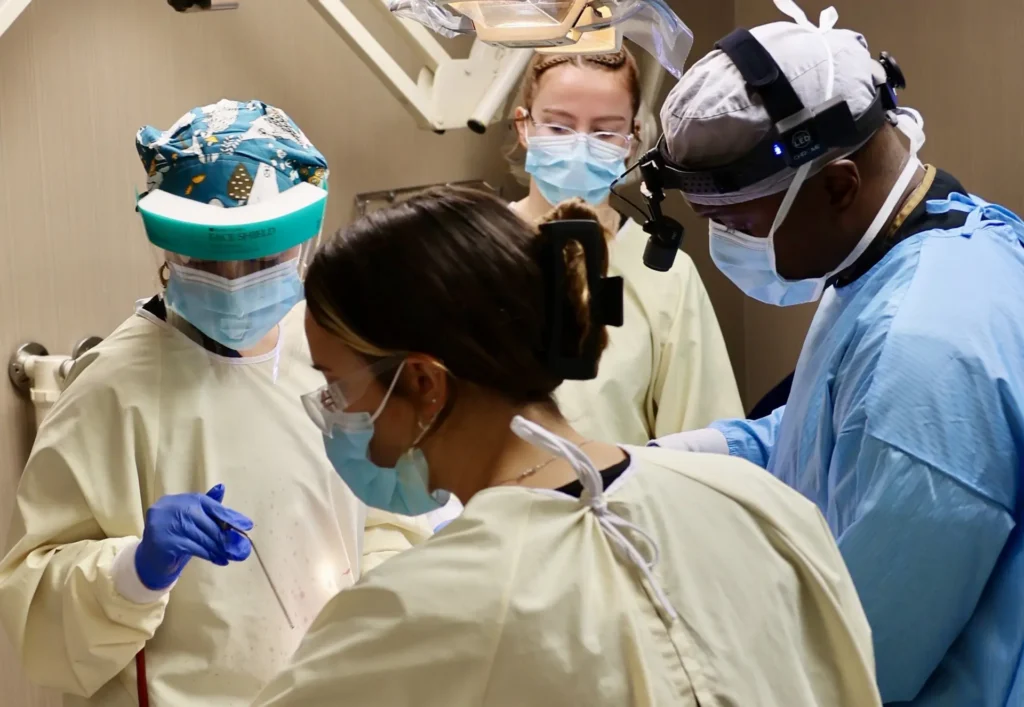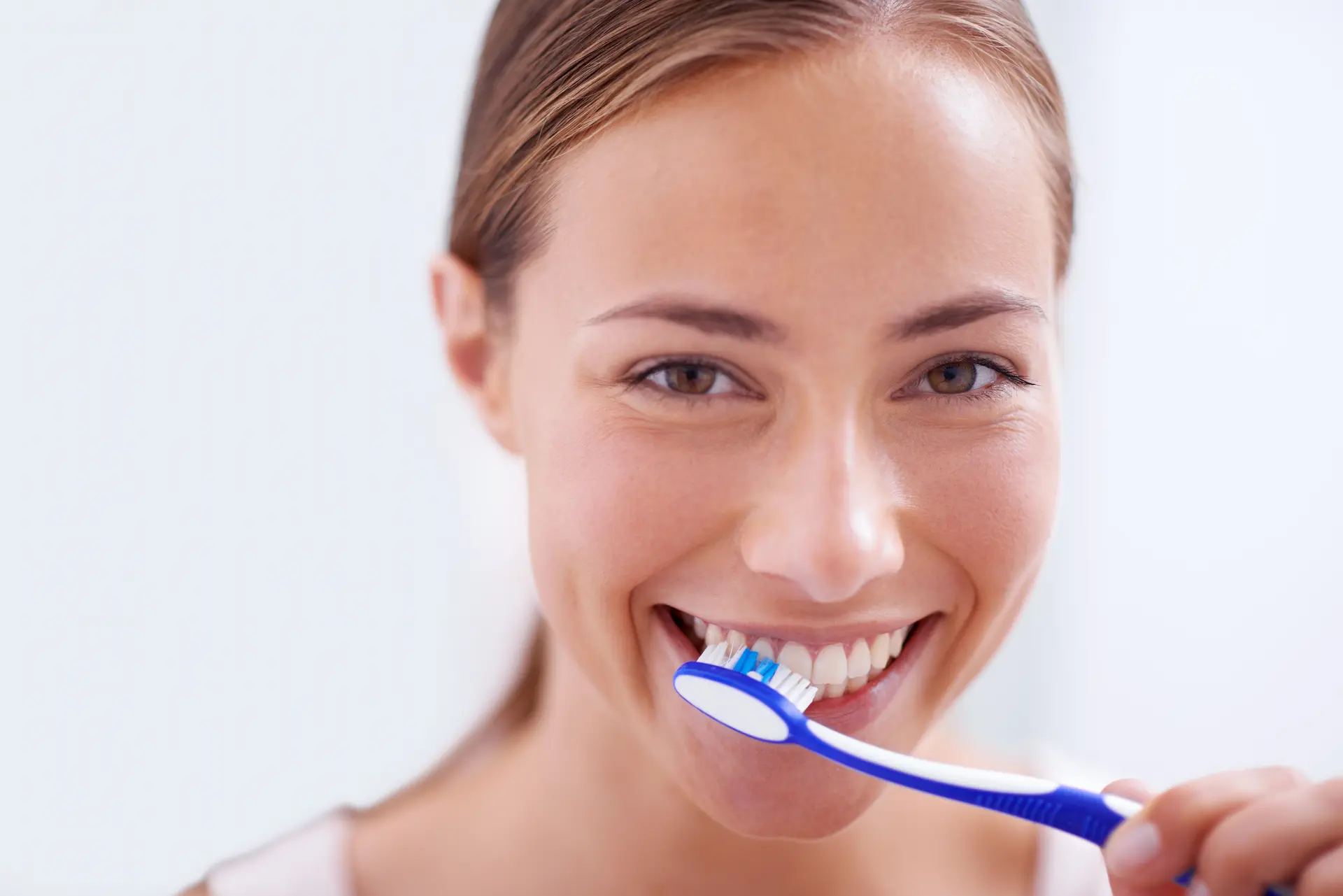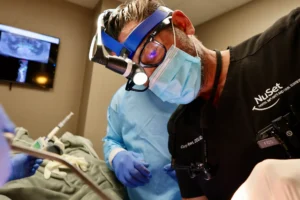Over 3 million people in the U.S. have dental implants, and that number keeps growing. Why? Because implants look, feel, and work like real teeth. They help you chew better, speak clearly, and smile with confidence. But what if your dental implant starts to smell?
It’s completely understandable that you might be alarmed. You might wonder if something is wrong. The truth is that dental implants don’t cause bad breath. This is a common misunderstanding. Implants don’t decay like natural teeth and they also don’t release any odor-causing substances.
Still, just like real teeth, implants need proper care. Bacteria can build up around the gums if you don’t clean them well. Which can lead to infection, which may cause bad breath. But you can prevent this with good oral hygiene and regular dental check-ups.
Let’s discuss why bad breath can happen with implants, how to fix it, and when to see a dentist.
Key Takeaways
- Dental implants do not cause bad breath. The issue comes from bacteria, trapped food, or poor oral hygiene.
- Bad breath with swelling, pain, or bleeding may be a sign of infection—see your dentist.
- Regular check-ups at NuSet Dental Implants and Oral Surgery help prevent problems and keep your implant healthy.
- If bad breath won’t go away, professional cleaning or treatment may be needed.
Why Does My Dental Implant Smell?
You might think your dental implant is causing bad breath, but that’s not the case. Implants are made from materials that don’t decay or release odors. They don’t rot like natural teeth, and they don’t absorb smells.
The issue is usually something else happening in your mouth. Bacteria, trapped food, dry mouth, or even a minor infection could be to blame. The good news is that these problems are easy to fix when caught early.
Before you worry, let’s go over the real reasons bad breath can happen—and how you can keep your implant clean and fresh.
What Causes Bad Breath?
Bad breath can happen to anyone, even if you have dental implants. The key is finding out what’s causing it so you can fix it. Most of the time, the problem isn’t the implant itself—it’s what’s happening around it.
Here are some common reasons your breath might not be as fresh as you’d like:
Bacterial Growth
Our mouth is full of bacteria (good). That’s normal! But if you don’t brush and floss regularly, bacteria can build up around your implant, creating an unpleasant smell. Using a soft toothbrush, flossing with a waterpik daily, and rinsing with an antibacterial mouthwash can help keep bacteria in check.
Food Particles
Tiny bits of food can get stuck around your implant, especially if you eat sticky or hard foods. If not cleaned properly, these food particles start to break down and cause odor. Water flossers and interdental brushes can help remove food from hard-to-reach areas.
Dry Mouth and Saliva Flow
Saliva helps wash away bacteria and food particles. If your mouth is dry, bacteria can grow more easily, leading to bad breath. Drinking plenty of water and chewing sugar-free gum can help keep saliva flowing. If dry mouth is a frequent issue, your dentist can recommend treatments to help.
Infection
In rare cases, bad breath can be a sign of an infection in the gum. If you notice swelling, pain, or bleeding along with an unpleasant smell, don’t ignore it. An infection can be easily treated, but it’s important to catch it early. If something doesn’t feel right, schedule a visit at NuSet Dental Implant and Oral Surgery for a check-up.
Dental Implants Don’t Cause Bad Breath by Themselves

Implants are made from biocompatible materials like titanium and zirconia. These materials don’t break down, decay, or produce odors.
The real cause of bad breath is what happens around your implant. If bacteria, food particles, or infection develop near the implant, that’s when odor can start. But this isn’t typically a flaw with the implant—it’s a sign that your oral health needs better care.
Think of implants like your original teeth. If you don’t brush or floss, bacteria will build up and cause bad breath. The same is true for implants. Proper hygiene and regular check-ups will keep your implants fresh and problem-free.
How to Prevent Bad Breath
Bad breath isn’t something you have to live with. A few simple habits can keep your mouth fresh and your dental implants in top shape.
Brush and Use Waterpik Floss Every Day
Good oral hygiene is the best way to prevent bad breath. Brush your teeth and implants twice a day with a soft toothbrush. Floss daily to remove food and plaque from hard-to-reach areas. A water flosser can also help clean around your implant.
Use Antibacterial Mouthwash
Rinsing with an antiseptic mouthwash helps kill bacteria and keeps your breath fresh. Choose an alcohol-free option to avoid drying out your mouth.
Stay Hydrated
Drinking water throughout the day helps wash away food and bacteria. It also keeps your saliva flowing, which naturally fights bad breath. If you often have a dry mouth, talk to your dental specialist about a tailored solution for you.
Get Regular Checkups at NuSet Dental Implant and Oral Surgery
Routine visits help catch any issues before they become serious. Your dental specialist will clean around your implant, check for signs of infection, and ensure everything fits properly. Regular professional cleanings can prevent odor-causing buildup.
Avoid Smoking and Tobacco
Smoking dries out your mouth and increases bacteria, leading to bad breath. It also raises the risk of gum disease and implant failure. Quitting can make a huge difference in your oral health.
A fresh, healthy mouth starts with good habits. Take care of your dental implants, and they’ll take care of you!
What to Do if You Have Persistent Bad Breath After Getting Implants
Some bad breath after surgery isn’t necessarily a cause for alarm. Your mouth is healing, and bacteria may build up as you adjust to your new implant. But if the odor doesn’t go away or gets worse, it’s time to take action.
Here’s what you can do:
Check Your Oral Hygiene
Are you brushing and using a water pik daily? If not, bacteria and food particles may be the problem. Try using a water flosser or interdental brushes for a deeper clean around your implant.
Drink More Water
A dry mouth allows bacteria to thrive. Drinking plenty of water helps wash away food and keeps your breath fresh.
Use an Antibacterial Mouthwash
A gentle, alcohol-free mouthwash can kill bacteria and reduce odor. Rinse once or twice a day for the best results.
If bad breath sticks around despite good oral care, let your dental specialist take a look. A quick checkup can identify any hidden issues, like a poor fit or early signs of gum disease.
Fresh Breath, Healthy Smile – NuSet Dental Implants and Oral Surgery Has You Covered!
Dental implants are a life-changing solution for missing teeth. They look natural, feel comfortable, and last for years. If you’re worried about bad breath, don’t be. Implants don’t cause odors—bacteria and poor hygiene do.
At NuSet Dental Implants and Oral Surgery, we can help ensure your implants stay clean and healthy. Whether you need a routine cleaning, a fit adjustment, or expert advice, we’re here to help. Our team is experienced in keeping implants in top shape so you can smile with confidence.
If you’re dealing with bad breath or have questions about your implant, don’t wait. A quick visit to our office can give you peace of mind and freshen your smile. Schedule your consultation today and keep your dental implants looking and feeling their best!
Frequently Asked Questions
How do I keep my dental implants from smelling?
Good oral hygiene is key. Brush twice a day, use a waterpik floss daily, and use an antibacterial mouthwash. Stay hydrated to prevent dry mouth, and visit your dental specialist for regular cleanings. A water flosser or interdental brush can help clean around your implant more effectively.
How do I know if my dental implant is infected?
Signs of infection include swelling, redness, pain, bleeding, or a bad taste in your mouth. If you notice any of these, contact your dentist right away. Treating an infection early can prevent serious complications.
How can you tell if a dental implant is going bad?
An implant should feel secure and comfortable. If you have pain or swelling, or if the implant feels loose, it’s a good idea to schedule a follow up visit with your dental specialist. Bad breath or a persistent bad taste can also be signs of a problem. See your specialist as soon as possible if you experience these symptoms.
Do dental implants cause bad breath?
No, dental implants themselves don’t cause bad breath. The problem usually comes from bacteria, trapped food, or gum disease. With proper care, your implant will stay fresh and odor-free.





